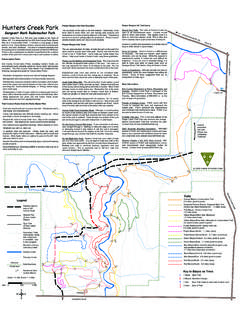Transcription of SMALL CLAIMS COURT: A USER’S GUIDE - Boteler, Finley & …
1 SMALL CLAIMS court : a user 'S GUIDE . Mark Wolfe, Attorney at Law Publication # 10-0802. Resolve your dispute without having to hire an attorney Provided as a courtesy of: Boteler & Wolfe Attorneys at Law 1252 Dauphin Street Mobile, Alabama 36604. 251 433-7766 or 1 866 975-7766 toll free helping injury victims and their families for over twenty years SMALL CLAIMS court : a user 'S GUIDE . TABLE OF CONTENTS. Introduction i Getting The Case Started 2. Tips for Effectively Presenting Your Case in SMALL CLAIMS court 3. Fee Chart (As of August 29, 2010) 5. Forms 6. Rules of SMALL CLAIMS court Procedure 7. About Boteler & Wolfe 11. helping injury victims and their families for over twenty years Introduction If you have a dispute with someone that involves $3, or less you may want to consider pursuing your claim in the SMALL CLAIMS court . This is an informal court similar to the People's court . It is a special civil division of the district court where individuals and/or businesses can settle disputes without the use of an attorney.
2 The procedures are simple, informal, inexpensive and there is no jury involved. The focus of this GUIDE is to help you file your claim and present your case in the SMALL CLAIMS court of Mobile County. A portion of the material contained herein is from the Mobile County SMALL CLAIMS court web site and the Alabama Administrative Office of Courts web site. The material in this handbook is provided free and as a courtesy. The reader is reminded that the law is dynamic and subject to change. Also, fees and procedures are subject to change. For more details about SMALL CLAIMS court visit: NOTE: While this material is specific to and references the SMALL CLAIMS court of Mobile County, Alabama most of the forms and suggestions are applicable to any SMALL CLAIMS court in Alabama. For more specifics about a SMALL CLAIMS court in another County or jurisdiction, type in SMALL CLAIMS court and the County and State to any of the major internet search engines and you should be able to find similar information for a SMALL CLAIMS court in your area or region.
3 The other thing to consider is whether it will be beneficial to file a lawsuit in SMALL CLAIMS court . Before you file a claim , you should contact the person or business you plan to sue and attempt to settle your dispute. This effort may save you time and money. In some instances, it costs as much or more than the actual claim to file and seek collections. You should also find out if the person or business you plan to sue has any money or assets to pay your CLAIMS , if you should win. Otherwise, you may have a difficult time collecting on a court judgment. Remember, it is up to you, not the court , to take further legal action against the person or business if they do not pay the judgment. This process can be handled through the mail; you only have to come to the courthouse when or if the case is set for a hearing. Even if you do not think the other side will agree to work out the dispute, you should send a letter or e-mail to the party full setting out the facts and why you think they should pay or reimburse you.
4 Make sure you date the communication and keep a copy for yourself. You can then use this letter as an outline of your case when it goes to trial. If you can not work out the dispute then you may want to pursue the matter in SMALL CLAIMS court . To use SMALL CLAIMS court , you must be an individual who has reached the age of 19. A partnership, or a corporation may also file a claim , with or without an attorney. If a partnership files without an attorney, the person representing the partnership must be a partner or employee of the partnership. If a corporation files without an attorney, the person representing the corporation must be an officer or full-time employee of the corporation. Getting The Case Started The Clerk's office for the SMALL CLAIMS court is on the third floor of the judicial building at the Mobile Government Plaza located at 200 Government Street in downtown Mobile. Inform one of the clerks of your intent to file a claim in the SMALL CLAIMS court and he or she will provide you with a form to be filled out, called a Statement of claim .
5 On the claim statement you will need to fill in the name of the individual or business that owes you money and you will need to provide a brief explanation as to why you claim the money is owed to you. When filling out the claim statement you will need the address for the person or business that owes you money. This is very important because your claim can not be served on the other party without an address. A work address for an individual may be acceptable if you can specify the work hours of the person to be served. After you complete your claim form you can turn it into the clerk and pay your filing fee. The amount of the filing fee depends on how much money you are seeking to recover and how many people or businesses you contend owe you that money. The filing fee is usually between $ and $ If you cannot afford the filing fee you can complete an Affidavit of Substantial Hardship and a Judge will determine whether the filing fee can be waived or suspended.
6 Once you turn in your claim form and pay the filing fee your case will be given a case number. You should use this number whenever you contact the court about your case. When your case is filed with the court you are known as the Plaintiff and the other party is the Defendant. Even though your case has been filed it does not become active until your Statement of claim is formally and legally presented to the Defendant. This is known as service of the lawsuit and it is done by the Sheriff's Department. (This is why you need the Defendant's address when filing your claim .) Or for an additional fee, your lawsuit can be served on the Defendant by Certified Mail. When the Defendant is served with your claim he or she will also be provided with a form called Defendant's Answer . The Defendant has 14 days to file an Answer after being served with your Statement of claim . If the Defendant fails to file an Answer to the Complaint within 14 days of service then you may ask the court to enter a Default Judgment in your favor.
7 The forms for requesting a default judgment are available at the Clerk's office. If the Defendant files an answer and denies the allegations of your claim , in whole or in part, then the court will notify you of a date and time for your trial. The Courtrooms for SMALL CLAIMS cases are on the 4th floor of the judicial building in the Mobile Government Plaza. Your trial notice will also indicate the Courtroom number where your case will be heard. At that time you will have an opportunity to present your case to the Judge. If you lose your case, you can appeal for a new trial in Circuit court within 14 days of the judgment. The party filing the appeal must be prepared to pay a filing fee of $ for a non-jury trial or $ for a jury trial and post a bond to cover any unpaid court costs. You may need the assistance of an attorney if you choose to appeal because the simplified procedures of SMALL CLAIMS court do not apply in Circuit court . If you win and the other side does not appeal, it is up to you to collect on the judgment.
8 See writ of execution and/or garnishment forms in the FORMS section. Tips for Effectively Presenting Your Case in SMALL CLAIMS court When preparing for trial you should get together all papers, receipts, bills, sale tickets, estimates, photographs, etc. related to your claim . You should also write down important facts and details of the case to assist you in telling why the Defendant owes you money. This is important because at trial you may be nervous and forget to tell the Judge an important fact or detail about your case. If you have an outline or notes you can use that to make sure the Judge knows all the facts needed for resolution of your claim . You can also bring witnesses to testify. If your case centers around an oral agreement and is not supported by a written agreement, you may want to bring witnesses who heard the oral agreement to court so that they can verify the agreement. If you think a witness will not voluntarily appear, you can ask the court to issue a subpoena requiring the witness to be present for trial.
9 If you want a subpoena issued you will need to let the Clerk know at least two w eeks before trial and you will need to pay an issuance fee of around $ On the day of your trial it is very important that you are on time! If for some reason you are running late or have an emergency on the day of trial, notify the court as soon as possible so that they may pass the information onto the Judge and other party. If you fail to show-up for your trial the Judge can dismiss your case. If you know in advance that you will not be able to be in court on your trial date, you should notify the Clerk and discuss the procedure for re-scheduling your trial date. It probably would be best to write the Clerk to ask for a continuance and send a copy of your request to the other party. The trial of a case in SMALL CLAIMS court is an informal hearing before the Judge, there is no jury. When the case is called for trial the parties will present themselves before the court .
10 The Judge will have all the parties and witnesses take an oath to testify truthfully and then the case will begin. The Plaintiff goes first and presents his or her evidence and calls any necessary witnesses. If you have a written statement from someone that you wish to present to the Judge, make sure the statement has been signed and notarized. Once the Plaintiff has finished, the Defendant will then be allowed to present his or her evidence and call witnesses. In any civil lawsuit the plaintiff carries the burden of proof. This means you must present evidence that is more credible than the evidence presented by the Defendant. The use of photographs and diagrams is allowed and may be very helpful in presenting your case. Also, when telling the Judge about your case identify people by name. Do not argue with the Defendant or witnesses. If the Defendant testifies, you have the right to ask him or her questions when they have finished. This is known as cross-examination.







